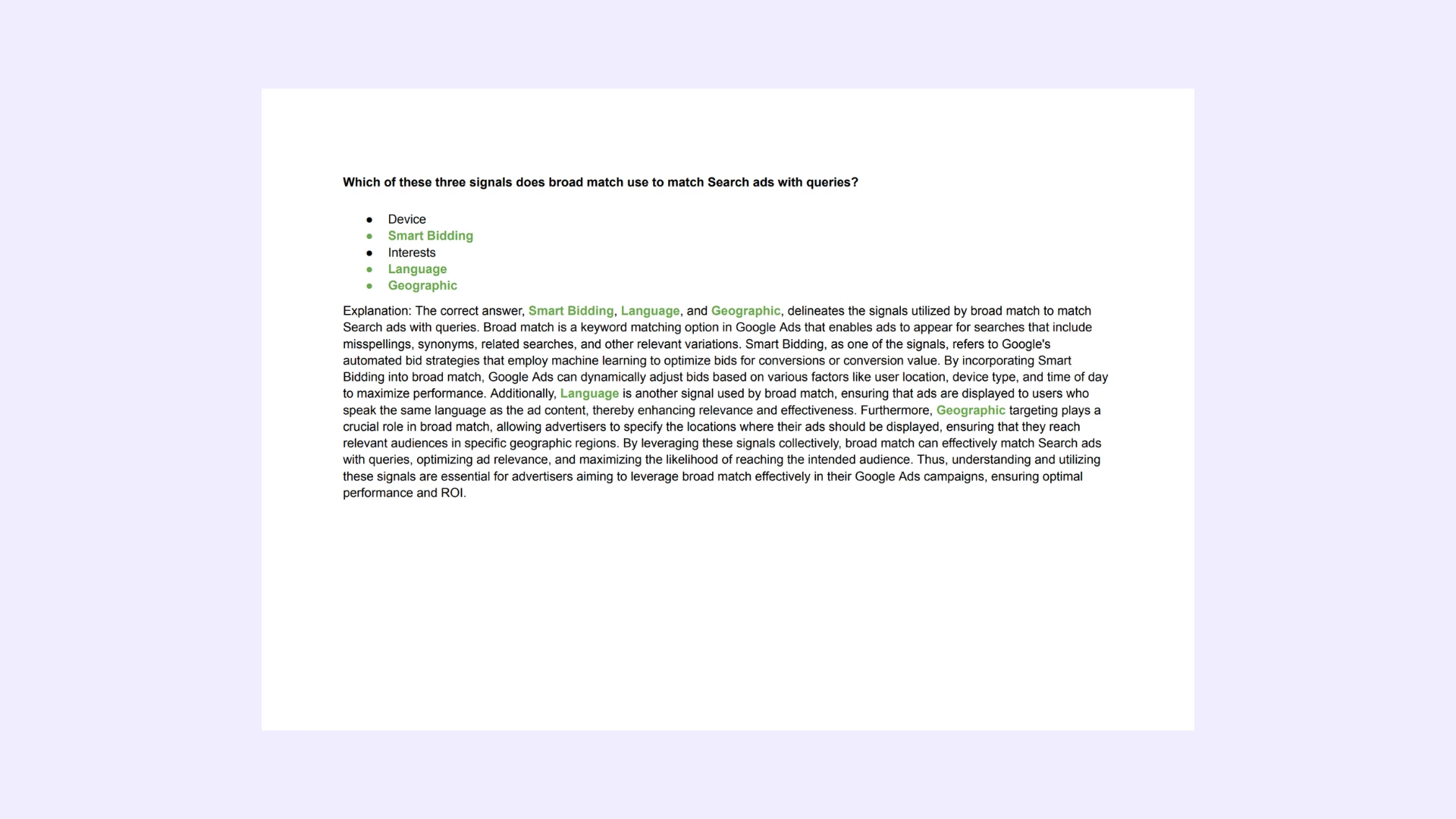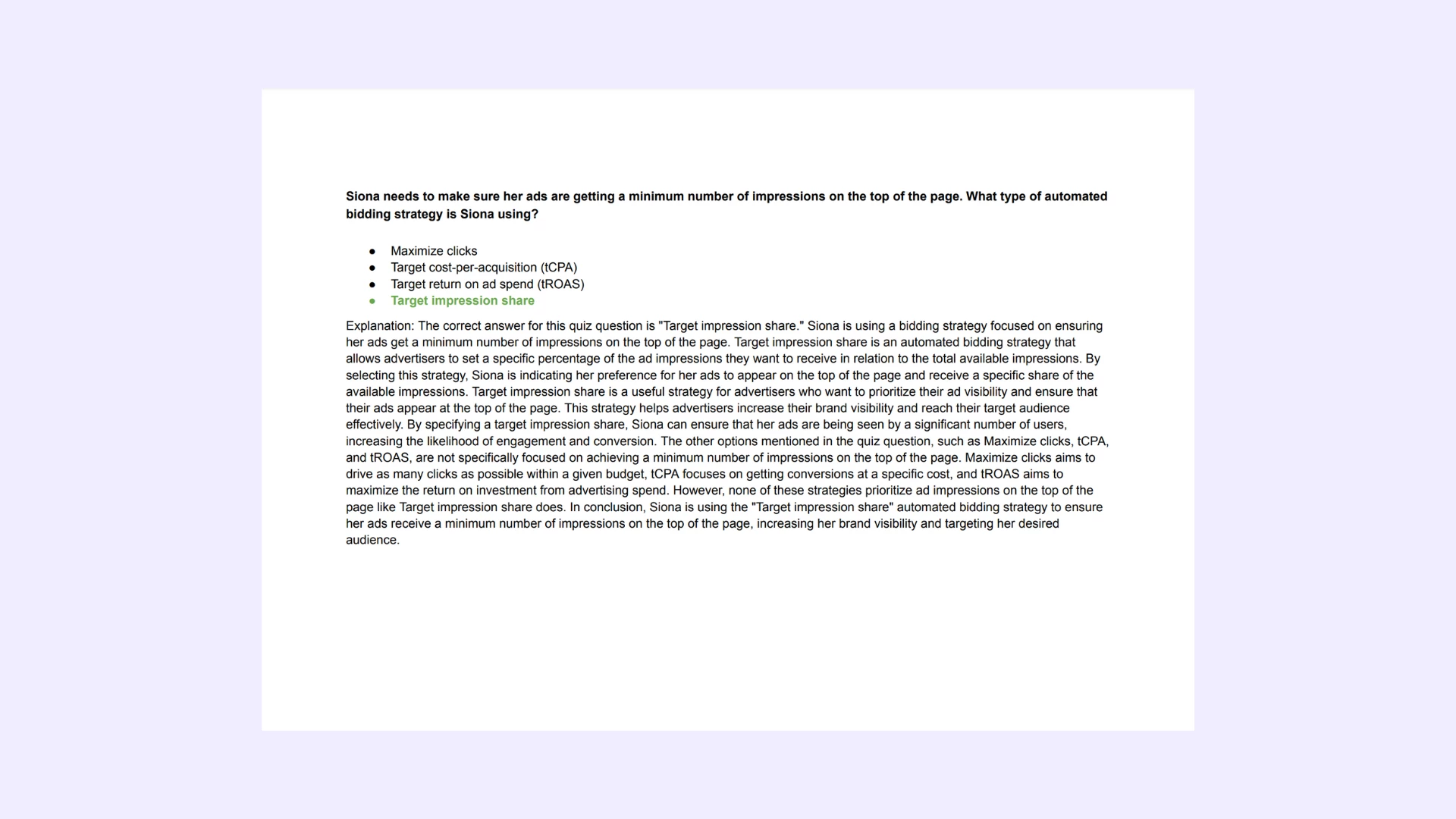A hungry customer is searching for a place to eat in Florence, Italy, where you happen to own a restaurant called Ristorante Abigaille. The customer performs each of these searches: 'restaurant tuscany,' 'restaurant florence,' '3 star restaurant florence,' and '3 star restaurant abigaille florence,' then finds your site by clicking on your ads. They make a reservation after selecting your ad that appeared following the '3 star restaurant abigaille florence' search. What keyword would receive credit for this conversion, if using the data-driven attribution model?
Each keyword would receive equal credit (i.e., 25% each) for the conversion, because the conversion would be attributed to each keyword equally.
The first keyword would receive 100% of the credit for the conversion, because the first keyword would be attributed with the conversion.
Each keyword would receive credit for how much it contributed to the conversion, because the conversion would be attributed to each keyword proportionally.
The last keyword would receive 100% of the credit for the conversion, because the last keyword would be attributed with the conversion.
Choose an option to see if it’s correct. Check the explanation below. Learn Smarter, not Harder.

Google Ads Roll. Includes Answers for Every Real Google Ads Certification Exam.
All-in-One: Get all Google Ads exams answers with explanations in one bundle. This package includes answers for every current Google Ads certification. Regular updates to reflect the latest exam version. -> See what's included.
Questions | Answers | Explanations. Free Lifetime Updates.


Need a single cerification exam answers? Check out our -> list of certification exams answer keys. Learn Smarter. Obtain or Renew your certificates with peace of mind!
Explanation: A hungry customer is searching for a place to eat in Florence, Italy, where you happen to own a restaurant called Ristorante Abigaille. The customer performs each of these searches: ‘restaurant tuscany,’ ‘restaurant florence,’ ‘3 star restaurant florence,’ and ‘3 star restaurant abigaille florence,’ then finds your site by clicking on your ads. They make a reservation after selecting your ad that appeared following the ‘3 star restaurant abigaille florence’ search. What keyword would receive credit for this conversion, if using the data-driven attribution model?
Explanation: In this scenario, if using the data-driven attribution model, **each keyword would receive credit for how much it contributed to the conversion, attributing the conversion to each keyword proportionally**. This answer is correct because the data-driven attribution model considers various touchpoints along the customer journey and assigns credit to each based on its influence on the conversion. In the given example, the customer performed multiple searches before making a reservation at Ristorante Abigaille. Each search query contributed to the customer's decision-making process, with the final search query directly leading to the conversion. However, it's essential to acknowledge that the earlier searches also played a role in guiding the customer's path to the conversion. Therefore, the data-driven attribution model would distribute credit among all the relevant keywords based on their respective contributions to the conversion, rather than attributing it solely to the first or last keyword. This approach provides a more comprehensive understanding of the customer journey and ensures that credit is allocated accurately to each touchpoint, enabling advertisers to optimize their campaigns effectively based on the true impact of their keywords.
Were do I find this certification program?
This certification program is available on the Google SkillShop Platform. With our file, you can get certified in just a few minutes. Free updates are included.
Save time on exams and spend more time practicing.
Best-value Guides
- Special Bundle Offer Google_Ads_Roll
- Special Bundle Offer HubSpot_Exams_Roll
- Special Bundle Offer Google_SkillShop_Roll
- Special Bundle Offer Marketing_Platforms_Roll